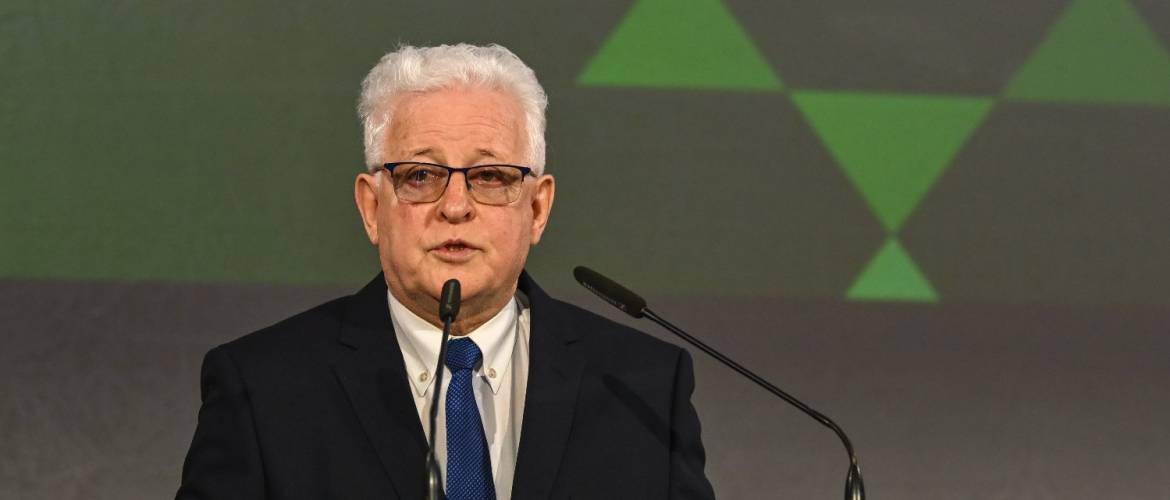To this day, it is painful to
face what happened, it is painful to face the loss. It is painful to face the
cruel obsession aiming to exterminate completely and at all costs the Jewry -
said Dr. Andor Grósz, Chairman of the Federation of Hungarian Jewish
Communities (Mazsihisz) and of the Board of Trustees of Holocaust Public
Foundation, at a commemoration on the occasion of the International Holocaust
Remembrance Day at the Holocaust Memorial Center in Budapest on 26 January.
The text below is an edited
version of Dr. Andor Grósz's speech at the event.
“It has been 79 years since the
liberation of Auschwitz, a symbol of Nazi monstrosity, evil, and inhumanity. In
2005, the United Nations designated this day as International Holocaust
Remembrance Day. I repeat…: The Remembrance Day was designated in 2005…
Six decades after the events!
For six decades, a significant
part of humanity tried to sweep what happened under the carpet, to ignore and
forget the horrors. In addition to the testimonies of those affected, the
survivors, it took a whole series of work of artists, writers, such as Robert
Merle and Primo Levi, director Steven Spielberg, or among the Hungarians I
could mention Mária Ember and our Nobel laureate Imre Kertész to wake up the indifferent
majority and make them to face the shocking facts.
Belatedly, but finally, the
International Day of Remembrance was set and since then we gather here every
year, at the Holocaust Memorial Center, to pay our respects to the memory of
the many millions of innocent victims whose lives were brutally extinguished in
the darkest period of the human history.
For those of us who are
personally affected by the tragedy, it is especially painful to look back on
the past and recall what happened. When I pass by the Memorial Wall of Victims by
the entrance, where fifty names of my immediate family and distant relatives are
engraved among the names of the two hundred thousand victims identified by now,
my heart sinks. Names of my relatives whom I could not meet, whom I could only
hear about from my father's stories, of whom only the memory remained.
To this day, it is painful to
face what happened, it is painful to face the loss. It is painful to face the
cruel obsession aiming to exterminate completely and at all costs the Jewry. It
is incomprehensible the fanatical blindness whose guiding principle was to wipe
out a people from the face of the earth that had lived together with others in
the heart of Europe for thousands of years, without warring and without threatening
anyone. Moreover, enduring the persecutions, pogroms, and exclusions themselves.
The immeasurable suffering
caused by the bearers of these horrid ideas is unfathomable. Unfathomable are
the torments that the Jews in Hungary had to live through when they were forced
into the ghettos, squeezed in boxcars, and deported, the vast majority of them to
be sent, after arriving at Auschwitz and a short selection procedure, to the
gas chambers within hours.
Inconceivable is the
suffering, anxiety and misery of the labor servicemen who contributed to the
defense of their country by being forced to work under inhumane conditions at
the front or tormented in mines, including the copper mine in Bor and the
manganese mine in Úrkút, while the same country robbed, tortured, dishonored
their families and sent them to their deaths.
Our goal is to remember and
remind.
First and foremost, it is to
remember the martyrs, because their names and existence cannot disappear
without trace, they cannot sink into oblivion. At the same time, we must
remember the process that led to the Holocaust, the social conditions that
allowed the spread of the horrid ideas that contributed to the fact that the
majority of the society watched with indifference the exclusion, deprivation
and destruction of their fellow citizens.
We must remember that the
Shoah could not have happened without this complicit silence, moreover the
enthusiastic, active participation of a part of the society. This is a fact
that many would like to forget. This is a fact that we must not forget.
We must remember, it is our
duty to remember, but when we remember our martyrs, we must not remember only
their death. The Nazi criminals decided to take their lives, but they
themselves determined their lives. We owe it to them to remember their lives
when we think of them. We present their lives, creations, worries and joys,
everything that characterized their living, strong, self-aware communities. We
owe it to them to remember them, not their killers.
How many times we heard
"never again" in the last eighty years?
How many vows and promises
that promised peace and security to the Jewish people! Nevertheless, three and
a half months ago, 1,400 women and men, elderly and babies were murdered by
Hamas terrorists in Israel in a single day. Five thousand people were injured,
many of them seriously, suffering permanent damage. 250 hostages were dragged
into the Gaza tunnels, many of their families are still waiting with
diminishing hope for their return home. Since the Holocaust the people of
Israel have not made such a blood sacrifice. And when the armed forces went
after the terrorists to free the hostages and prevent a repeat of the massacre,
anti-Semitism soared to Nazi-era heights in many parts of the world. In many
countries, the governments and the police have silently tolerated marching
crowds cheering terrorists, to openly proclaim their anti-Semitism disguised as
anti-Israel sentiments. It is feared that openly professed anti-Israelism in
many places will fan the dormant embers of anti-Semitism.
We appreciate the efforts of
the Hungarian government, with which it consistently applied the principle of
zero tolerance against anti-Semitism, thus our country was able to remain an
island of peace in this respect as well.

 02.20. 16:56, out: 02.21. 18:02
02.20. 16:56, out: 02.21. 18:02 


